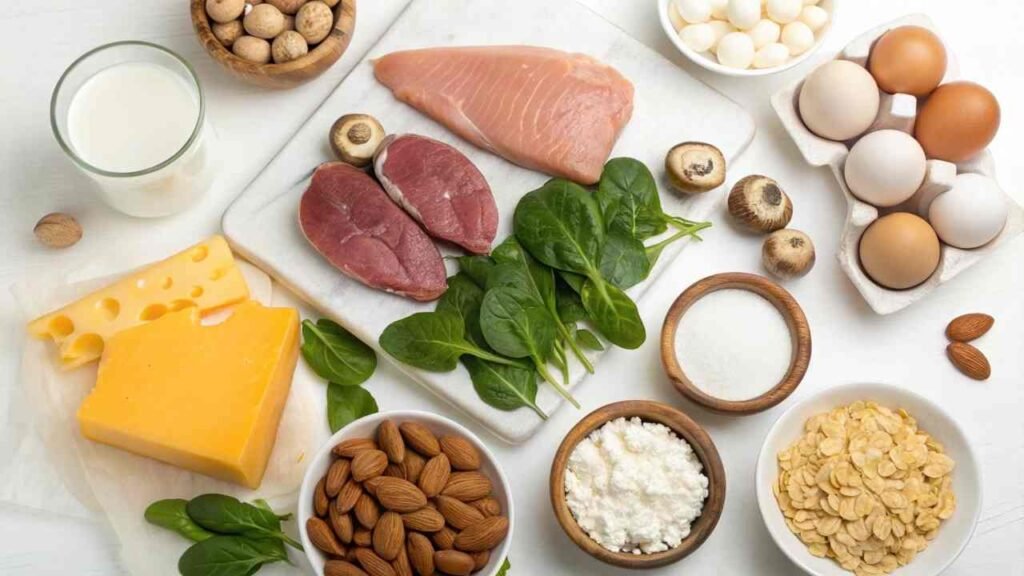Ever wonder about Vitamin B2? Confused about its sources or importance? Let's get straight facts on riboflavin for your health.
Vitamin B2 (riboflavin) is key for energy, cell function, and healthy metabolism. Find it in dairy, lean meats, eggs, and leafy greens. Cooking can reduce it; deficiency hits skin and vision.
At FINETECH, we deal with food ingredients, and understanding essential nutrients like Vitamin B2 is important. It helps everyone appreciate quality food. Let's cover what consumers need to know about riboflavin.
What are the best natural food sources to get enough Vitamin B2 daily?
Want more Vitamin B2 naturally? Which foods are riboflavin powerhouses? Let's list the top dietary sources.
Get Vitamin B2 from dairy (milk, cheese), eggs, lean meats (beef liver is top), poultry, fish, almonds, and leafy greens (spinach). Fortified grains are also key sources.
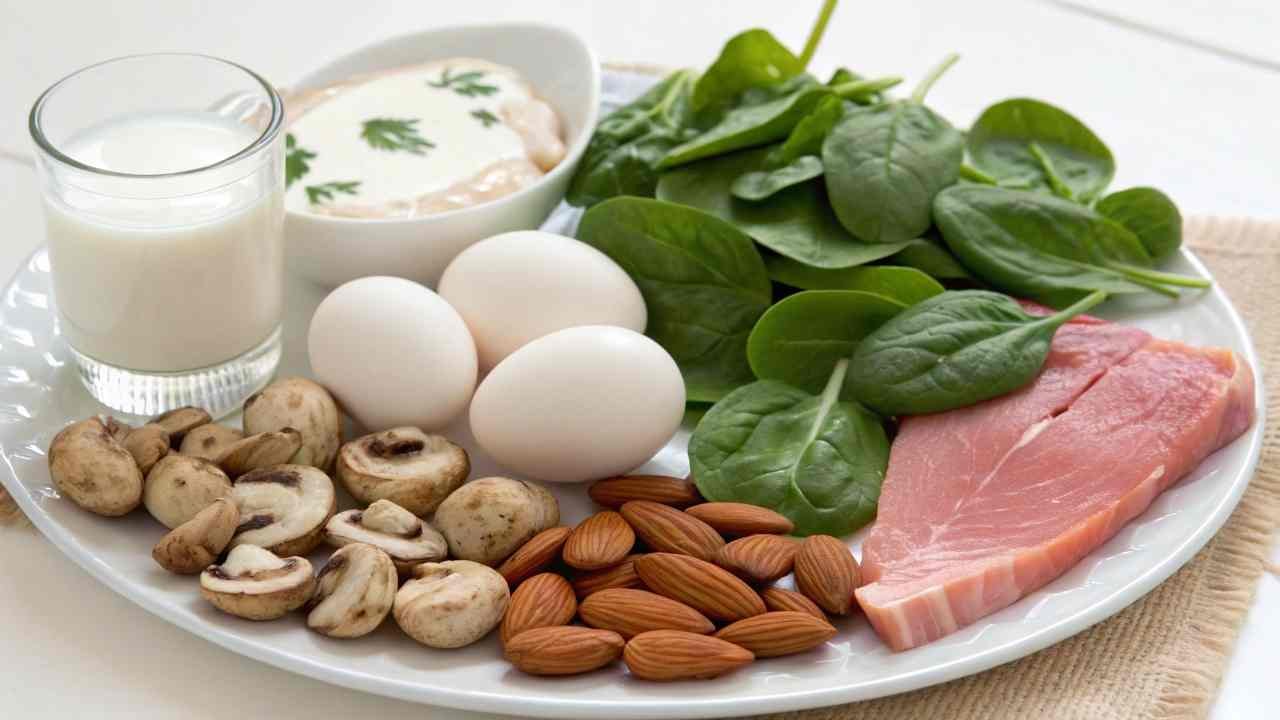
Knowing where to find Vitamin B2 is step one for getting enough.
- Animal Sources: Dairy (milk, yogurt, cheese), eggs, beef liver (very high), lean meats, poultry, fish (salmon, trout).
- Plant Sources: Leafy greens (spinach, asparagus), almonds, legumes, mushrooms.
- Fortified Foods: Many breads, cereals, and pastas are enriched with B2, making them important contributors.
A varied diet usually provides enough.
Top B2 Food Sources:
| Food Source | B2 Level Indicator | Category |
|---|---|---|
| Beef Liver | Very High | Organ Meat |
| Fortified Cereal | High (varies) | Fortified Grain |
| Yogurt/Milk | Good | Dairy |
| Almonds | Good | Nuts |
| Lean Meat/Egg | Moderate | Meat/Eggs |
| Spinach | Moderate | Green Vegetable |
How much Vitamin B2 is typically lost when foods are cooked or processed?
Does cooking destroy Vitamin B2? How does processing affect it? Let's look at riboflavin's stability.
Vitamin B2 is fairly heat-stable but very light-sensitive. It's also water-soluble, so it leaches into cooking water. Boiling/blanching and light exposure (milk in clear bottles) cause significant loss.
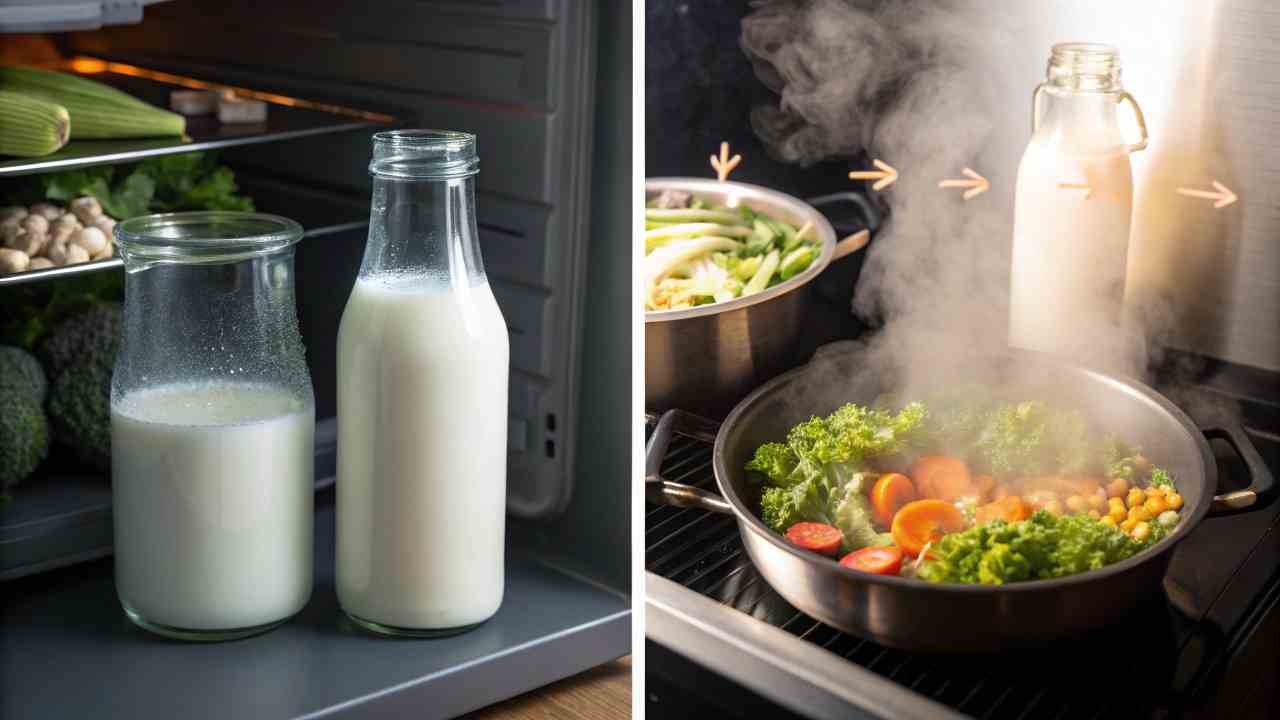
Vitamin B2's main enemies are light and water.
- Light Sensitivity1: UV/visible light rapidly destroys B2. Milk in clear bottles loses B2 fast; opaque containers protect it.
- Water Solubility2: B2 leaches into water during boiling or soaking if the water is discarded. Steaming or microwaving preserves more.
- Heat Stability3: Relatively stable to normal cooking heat if light/water losses are minimized.
- Processing: Milling grains removes B2 (hence fortification). Pasteurization has minimal effect if light is controlled.
To save B2: use opaque containers for milk, steam veggies instead of boiling, and avoid overcooking.
B2 Loss Factors:
| Factor | B2 Vulnerability | How to Minimize Loss |
|---|---|---|
| Light | Very High | Use opaque containers, store in dark. |
| Water | High | Steam/microwave, don't discard water. |
| Heat | Moderate | Avoid prolonged overcooking. |
Are there specific diets or lifestyles that increase a person's need for Vitamin B2?
On a special diet or very active? Could you need more Vitamin B2? Let's see who might have higher riboflavin needs.
Yes, strict vegans (without fortified foods), pregnant/lactating women, athletes, people with malabsorption, and chronic alcohol users may need more Vitamin B2.

Certain situations increase B2 needs or risks of inadequacy:
- Vegans/Strict Vegetarians: Fewer rich B2 sources if not using fortified foods (plant milks, nutritional yeast).
- Pregnancy/Lactation: Higher needs for fetal growth and milk production.
- Athletes: Increased energy metabolism may demand more B2.
- Alcohol Abuse: Impairs B2 absorption and use.
- Malabsorption Issues: Conditions like celiac or Crohn's disease reduce absorption.
- Thyroid Disease: Can affect B2 status.
These groups should focus on B2-rich foods and possibly consult a healthcare provider.
Groups with Higher B2 Needs/Risk:
| Group | Reason |
|---|---|
| Vegans (unfortified diet) | Lower intake from common rich sources |
| Pregnant/Lactating Women | Increased physiological demand |
| Athletes | Higher energy turnover |
| Chronic Alcohol Users | Impaired absorption/utilization |
| Malabsorption Conditions | Reduced nutrient uptake |
What are some early warning signs that you might be low on Vitamin B2?
Feeling off? Could it be low Vitamin B2? Let's check the early symptoms of riboflavin deficiency.
Early signs of low B2 (ariboflavinosis) include sores/cracks at mouth corners (angular cheilitis), chapped lips, a sore/red tongue (glossitis), and greasy, scaly skin rashes (seborrheic dermatitis).
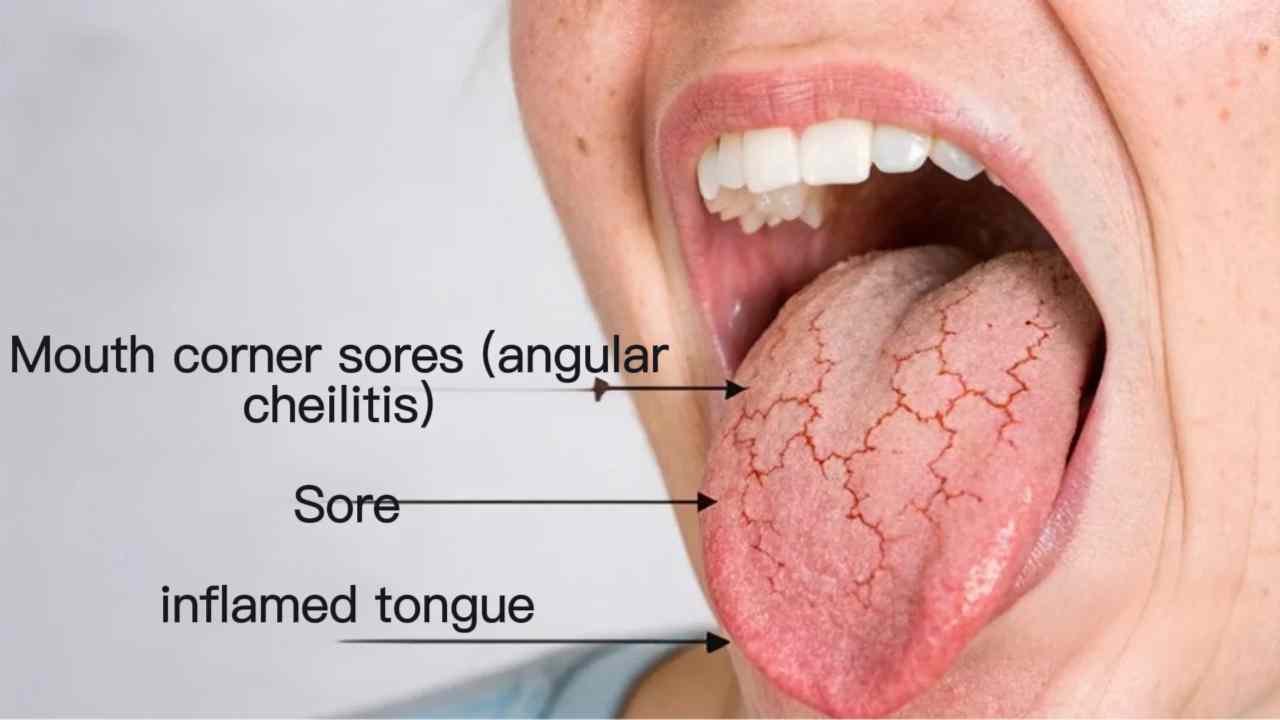
B2 deficiency often shows up around the mouth and on the skin first:
- Oral Signs: Cracks at mouth corners (angular cheilitis), chapped/swollen lips (cheilosis), sore/red/smooth tongue (glossitis), sore throat.
- Skin Signs: Greasy, scaly rash (seborrheic dermatitis), often near nose, eyebrows, ears. Dry, itchy skin.
- Eye Signs: Light sensitivity, itchy/burning eyes. More advanced: corneal issues.
- Other: Fatigue, weakness, anemia (sometimes).
These symptoms can have other causes, so see a doctor for diagnosis.
Common Early B2 Deficiency Signs:
| Symptom Area | Sign(s) |
|---|---|
| Mouth/Lips | Cracks at corners, chapped, sore tongue |
| Skin | Greasy/scaly rash, dryness |
| Eyes | Light sensitivity, irritation |
| General | Fatigue |
Why is Vitamin B2 important for healthy skin and good vision?
Why do skin and eyes suffer when B2 is low? What's B2's role? Let's look at its importance for skin and vision.
Vitamin B2 is key for skin cell growth, repair, and collagen support. For vision, it aids retinal function and protects eye tissues from oxidative stress, helping maintain clarity.
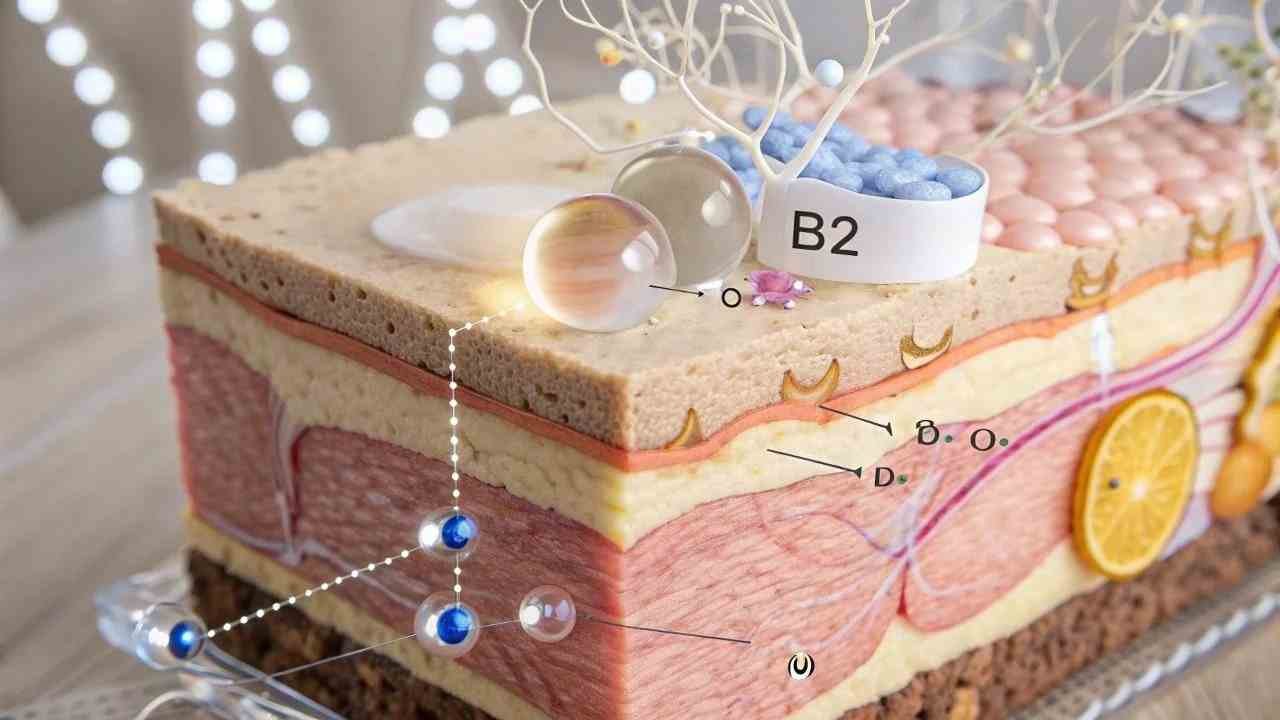
Vitamin B2 (as FMN and FAD coenzymes) is vital for many body processes.
For Skin Health:
- Cell Energy & Repair: Fuels growth and turnover of skin cells.
- Mucous Membranes: Keeps linings (like in the mouth) healthy.
- Antioxidant Defense4: Helps regenerate glutathione to protect skin from damage.
- Fatty Acid Metabolism5: Important for skin barrier function.
For Good Vision:
- Retinal Function: Involved in converting Vitamin A for light detection.
- Corneal Health: Maintains clear cornea; deficiency can cause clouding.
- Antioxidant Protection: Protects eye lens and retina from oxidative damage (linked to cataracts/AMD).
B2's Roles in Skin & Vision:
| Area | B2's Key Contribution |
|---|---|
| Skin | Cell energy/repair, antioxidant defense |
| Vision | Retinal function, corneal health, antioxidant |
B2's fundamental roles in energy and protection directly impact these active tissues.
Conclusion
Vitamin B2 (riboflavin) is crucial for energy, skin, and eye health. Find it in dairy, meats, eggs, greens, and fortified foods. Mind cooking methods and individual needs.
-
Understanding light sensitivity can help you preserve Vitamin B2 in your diet effectively. ↩
-
Learn how cooking methods impact Vitamin B2 retention to optimize your nutrition. ↩
-
Discover the heat stability of Vitamin B2 to ensure you are cooking it correctly for maximum benefits. ↩
-
Learn about the role of Vitamin B2 in regenerating glutathione and protecting skin from damage. ↩
-
Discover the importance of Vitamin B2 in maintaining skin barrier function through fatty acid metabolism. ↩

